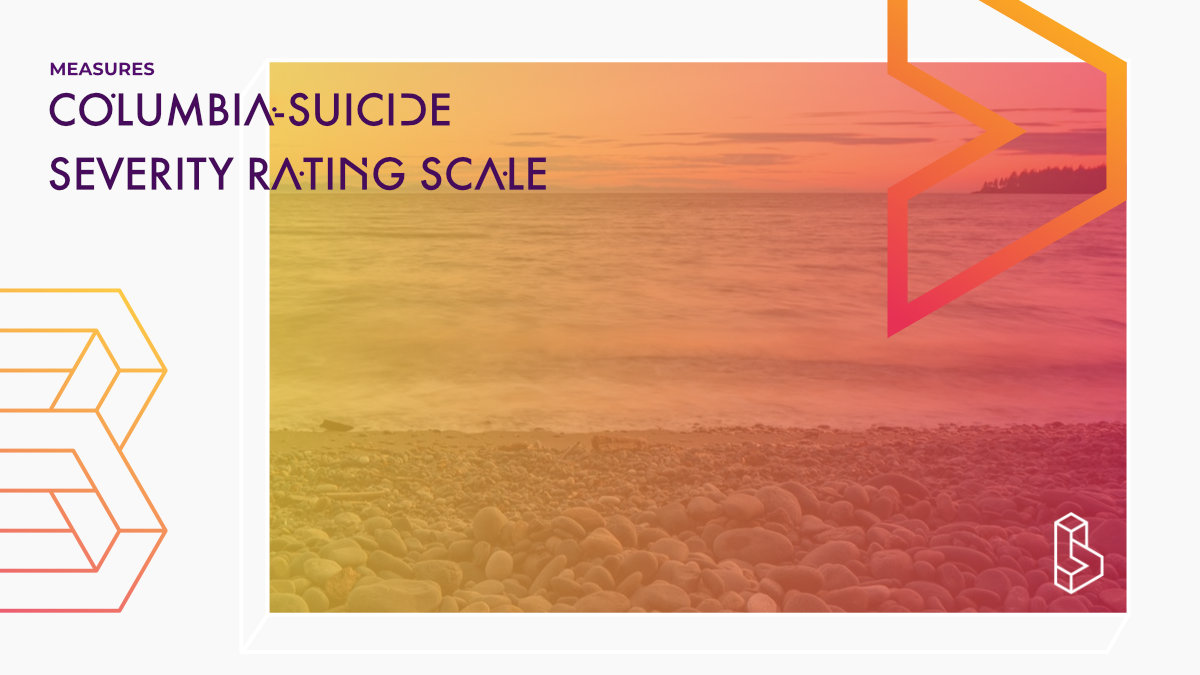The Columbia-Suicide Severity Rating Scale (CSSRS) is a suicidal ideation and behaviour rating scale created by researchers at Columbia University, University of Pennsylvania, University of Pittsburgh and New York University to evaluate suicide risk
It rates an individual’s degree of suicidal ideation on a scale, ranging from “wish to be dead” to “active suicidal ideation with specific plan and intent and behaviours.” The scale identifies specific behaviours which may be indicative of an individual’s intent to kill oneself.
Active? Yes
First used: 01 January 1970
Related Papers
Single-Dose Psilocybin for a Treatment-Resistant Episode of Major DepressionThis double-blind active-placebo controlled trial (n=233) tested the effect of a single dose of psilocybin (25/10/1mg) with supportive therapy for treatment-resistant depression. The primary endpoint at three weeks finds a significant reduction in depressive symptoms (MADRS, 12-point drop from baseline of 32) that was significantly greater in the 25mg group vs the 1mg (placebo) group (6.6 points larger drop). The response (>50% drop in MADRS score) in the 25mg group dropped from 37% at 3 weeks to 20% at 12 weeks.
Related Trials
The Safety and Efficacy of Psilocybin in Patients With Treatment-resistant Depression and Chronic Suicidal IdeationThis study aims to explore the safety and tolerability of a single dose of psilocybin (25mg) administered under supportive conditions to adult participants with TRD and chronic suicidal ideation.
Effect of Ketamine vs. Active Placebo on Suicidal Ideation in Depressed Inpatients With Major Depressive Disorder or Bipolar Depression
The purpose of this study is to conduct a pilot trial of IV ketamine + treatment as usual (TAU) vs. midazolam (an active placebo) + TAU to estimate sample size for a full-scale RCT examining these treatments for decreasing suicidal ideation among depressed inpatients with major depressive disorder and bipolar depression.
Efficacy And Tolerability Of Sub-Anesthetic Ketamine In Postpartum Depression
The purpose of this study is to assess the safety, pharmacokinetics and antidepressant efficacy of sub-anesthetic dose of intravenous ketamine in perinatal depression.
Evaluation of Psilocybin in Anorexia Nervosa: Safety and Efficacy
The primary aim of this study is to assess the safety and tolerability of one 25 mg dose of psilocybin in participants with anorexia nervosa based on adverse events (AEs), changes in vital signs, electrocardiograms (ECGs) and clinical laboratory tests. The secondary objectives are to explore the efficacy of a single 25 mg dose of psilocybin on eating disorder symptoms and behaviors, body image, anxiety, food related obsessions and rituals, and body weight.
Ketamine Alcohol (in Treatment-Resistant Depression)
This open-label trial (n=60) tests the hypothesis that ketamine (35mg/70kg) infusion will be especially effective in those who have a family history of alcohol abuse (Family History Positive, FHP).
MDMA-assisted Psychotherapy for Anxiety Associated With a Life-threatening Illness
This Phase 2 pilot study is a randomized, double-blind, placebo-controlled study in 18 participants comparing the effects of MDMA-assisted therapy vs. placebo with therapy.
Open Label Ketamine Treatment for Major Depressive Disorder in Veterans
Medically healthy Veterans ages 21-75 that have been diagnosed with Depression will get up to 6 treatments of Ketamine infusions, weekly. After treatment is completed, follow up will occur at 1 month, 3 months, and 6 months after completion of infusions to evaluate the longer term effects of ketamine.
Psychological Effects of Methylenedioxymethamphetamine (MDMA) When Administered to Healthy Volunteers
This study will compare the effects of methylenedioxymethamphetamine (MDMA) and placebo on mood and psychological experience in people trained to practice MDMA-assisted psychotherapy in a therapy-like setting.
Study Comparing Three Doses of MDMA Along With Psychotherapy in Veterans With Posttraumatic Stress Disorder
This study is designed to provide information on whether psychotherapy ("talk therapy") combined with the drug MDMA is safe and helpful for subjects with posttraumatic stress disorder (PTSD).
The Impact of Ketamine on the Reward Circuitry of Suicidal Patients
The investigators propose to study the neurocircuitry of suicidal thoughts, regardless of whether or not depression is present.

